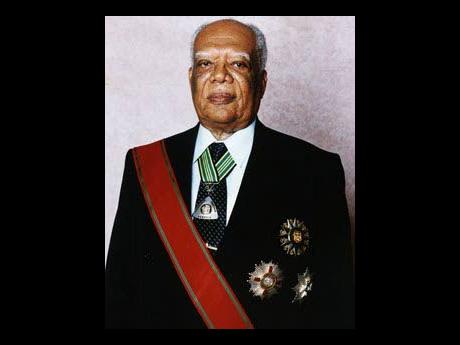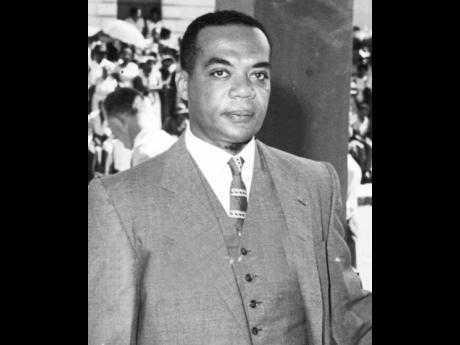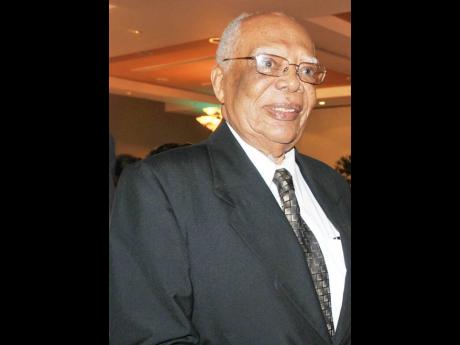Howard Cooke – From barefoot schoolboy to ‘dignified’ GG
Should any of our six governors general be designated the one who ascended farthest from the grass roots to the highest office in the land, it would have to be Sir Howard Cooke more than any other.
He was born on October 13, 1915, into a family whose home had once been the converted slave barracks on an old sugar estate. He, who would walk over long distances during seasons of drought to fetch water, occupied King’s House for 15 years. It was a long way from the free village of Goodwill in St James for the man whose parents were Mary Jane Minto, seamstress and butcher; and David Brown Cooke, wheelwright and carpenter.
THE ABILITY
Known as a rebellious schoolboy, Cooke’s initial education was at elementary and private schools. In 1933, at age 18, Howard Cooke got into Mico Teachers’ College among the top 20 of 120 candidates. Because of his performance in the entrance examination, he was selected to teach the first lesson that year at Mico Practising School. That lesson, on ‘Books’, was deemed the worst to be delivered at the college in a very long time. Yet he was told he had the ability to control the classroom and handle the children.
The shell-shocked Cooke was eventually mentored by an instructor named E. A. Moore, who helped him to achieve the highest mark in the college that year. He left in 1935 with the Duff Memorial Prize but returned a month later to teach sports and agriculture, as well as classes at Mico Practising School, until 1939.
Cooke left Mico College and Practising School to serve as headmaster at Belle Castle All-Age School, Port Antonio Upper School, and Montego Bay Boys’ School. He was a member and former president of the Jamaica Union of Teachers (JUT), and at age 21, he became the president of the St Andrew Teachers’ Association.
He was the quintessential all-rounder in his youth as he captained the county of Cornwall cricket team, was a member of the then Mico Teachers’ College, YMCA, Portland, and St James football teams, was a group scoutmaster and secretary for the St Andrew Boys’ Scout Association. He assisted in the establishment of community centres in east Portland and various community organisations in St James.
Cooke was also a member of the Jamaica Cultural Development Commission (JCDC) and was secretary and local chairman of the St James Cultural Commission. He adjudicated JCDC Festival competitions, was a senior elder and lay pastor in the United Church of Jamaica and The Cayman Islands, was a lay pastor and past chairman of the Cornwall Council of Churches, and was a member of the Free and Accepted Order of Masons.
In 1938 when he was 23, Howard Cooke and another member represented the JUT in the establishment of the People’s National Party, of which he became a founding member and whose constitution he helped to draft. He had been a chairman and a member of the National Executive of the party. From 1958 to 1962, he was the St James representative on the West Indies Federal Parliament.
He was a senator from 1962 to 1967, a member of the House of Representatives from 1967 to 1980, a government minister from 1972 to 1980, as well as president of the Senate from 1989 to 1991. He also served on the executive of the Commonwealth Parliamentary Association. From education and politics, Howard Cooke moved to the insurance industry in which he worked in top-management positions until 1991. On August 1 that year, ‘Teacher Cooke’, as he was popularly called, became the third native governor general since Jamaica gained Independence.
HIS COMMITMENT
For his commitment to his country, among other reasons, the man who was born in a ‘free village’, established for the settlement of newly emancipated enslaved Africans, was the recipient of multiple awards and accolades. They included, but were not limited to, the Order of the Nation and the Knight Grand Cross of the Most Distinguished Order of St Michael and St George in 1991; the Mico College Gold Medal Award for outstanding service, also in 1991; and the Knight Grand Cross of the Royal Victorian Order in 1994.
Sir Howard Cooke demitted office on February 16, 2006. He died eight years later, on Friday, July 11, 2014, at the age of 98. He had married Sylvia Lucille Tai, on July 22, 1939. They had two sons, Howard Fitz-Arthur Cooke and Richard Washington McDermott Cooke, and one daughter, Audrey Faith Cooke.
The boy who could not wear shoes to school evolved into an award-winning master teacher, a minister of education, and into having a school (Howard Cooke Primary in Montego Bay) and a road (Howard Cooke Boulevard in Montego Bay) named after him. Sir Howard Felix Hanlan Cooke was truly a remarkable man with a remarkable story, which is well told in his 2003 biography, They Call Me Teacher.



